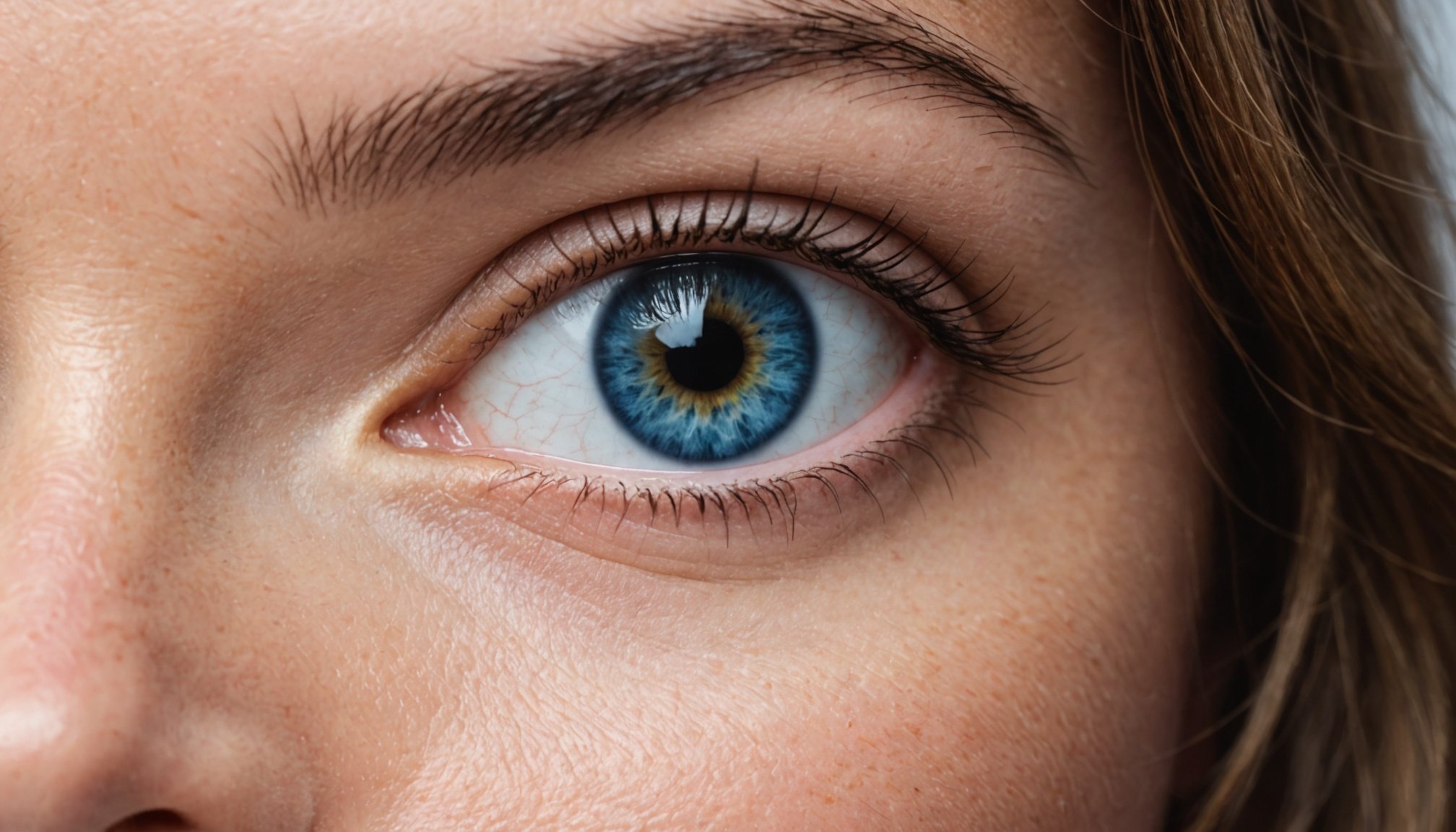Vital Strategies for Caring for and Safeguarding Delicate Eyes
Taking care of your eyes is one of the most crucial aspects of maintaining overall health, as they are among the most sensitive and vital organs of our body. Here, we will delve into the essential strategies for safeguarding your eye health, with a particular focus on preventing and managing conditions like diabetic retinopathy.
Understanding the Risks: Diabetic Retinopathy and Other Eye Conditions
Diabetic retinopathy is a significant complication of diabetes that can lead to severe vision loss and even blindness. It occurs when high blood sugar levels damage the blood vessels in the retina, the part of the eye responsible for capturing light and sending signals to the brain[1].
Also to discover : Effective natural techniques to calm your nerves before crucial meetings or presentations
Key Risk Factors
- Hyperglycemia: High blood sugar levels are the primary risk factor for diabetic retinopathy. Strict glycemic control is essential in minimizing this risk[2].
- High Blood Pressure: While intensive blood pressure control can reduce the risk of developing diabetic retinopathy, it does not significantly impact the progression of existing retinopathy[2].
- Dyslipidemia: Elevated serum cholesterol and triglyceride levels are associated with diabetic retinopathy, though the evidence on the effect of statin and fibrate treatment is mixed[2].
Preventive Measures: Protecting Your Eyes from Diabetic Retinopathy
Prevention is the most powerful tool against diabetic retinopathy and other eye conditions. Here are some vital strategies to reduce the risk:
Strict Blood Sugar Control
Maintaining stable blood sugar levels is crucial. This involves a combination of healthy eating, regular exercise, and adherence to prescribed medications or insulin therapy. The Diabetes Control and Complications Trial showed that a decrease of about 10% in HbA1c resulted in a 39% decrease in the risk of diabetic retinopathy progression[2].
Have you seen this : Ultimate nail care guide: proven techniques to boost strength and prevent breakage
Regular Eye Exams
Scheduling annual diabetic retinopathy exams is essential for early detection and timely intervention. These exams allow eye specialists to identify retinal changes before symptoms become noticeable. For instance, the American Academy of Ophthalmology recommends comprehensive eye examinations for people with diabetes to detect any signs of retinopathy early[2].
Managing High Blood Pressure and Cholesterol
Keeping high blood pressure and cholesterol levels in check through lifestyle changes and medications can significantly lower the risk of developing diabetic retinopathy. While the impact of blood pressure management on retinopathy progression is mixed, controlling these factors is beneficial for overall health[2].
Treatment Options for Diabetic Retinopathy
While there is no cure for diabetic retinopathy, several treatments can help manage the condition and slow its progression.
Diabetic Retinopathy Laser Treatment
Laser surgery, or photocoagulation, is a common treatment that seals leaking blood vessels and shrinks abnormal ones. This method prevents further damage and stabilizes vision, although it does not typically restore lost vision[1].
Anti-VEGF Injections
Anti-VEGF injections inhibit vascular endothelial growth factor, reducing swelling and improving retinal health. These injections are particularly effective for patients with advanced diabetic retinopathy and can help preserve vision. For example, the RISE and RIDE trials showed that ranibizumab significantly improved vision in patients with clinically significant macular edema[2].
Surgery (Vitrectomy)
In severe cases, a vitrectomy may be necessary to remove the vitreous gel inside the eye, along with any blood and scar tissue. This procedure addresses complications like retinal detachment or persistent bleeding but is generally reserved for advanced stages of the disease[1].
Advanced Screening Technologies
Early detection is crucial, and advanced technologies are making it more accessible and efficient.
AI-Driven Screening
Platforms like CheckEye use AI-driven algorithms to detect chronic diseases, including diabetic retinopathy, through photographic images of the eye fundus. These photographs can be taken anywhere, from optical retailers to pharmacies, by non-medical staff and then uploaded for diagnosis. This approach reduces waiting times and makes early detection more cost-effective[3].
Living with Diabetic Retinopathy: Coping Strategies and Support
For those diagnosed with diabetic retinopathy, adapting to vision changes and maintaining quality of life is vital.
Coping Strategies for Vision Loss
Simple adjustments, such as organizing living spaces for easier navigation or using high-contrast colors, can make daily tasks more manageable. Occupational therapy can offer additional strategies tailored to individual needs. For instance, using assistive technologies like magnifiers, screen readers, and text-to-speech tools can empower individuals to maintain their independence[1].
Assistive Devices
Assistive technologies are widely accessible and easy to use. These devices help individuals with vision loss to continue performing daily tasks with minimal assistance. Support groups also provide emotional and practical support, allowing people to share experiences and tips for living with vision loss[1].
General Eye Care Tips
Beyond diabetic retinopathy, there are several general tips to protect your eye health.
Healthy Diet and Lifestyle
A diet rich in fruits, vegetables, and omega-3 fatty acids can help protect your eyes. Regular physical activity and avoiding smoking also contribute to overall eye health. For example, stopping smoking can significantly improve the management of diabetes and reduce the risk of eye complications[5].
Proper Use of Contact Lenses
For people who use contact lenses, proper hygiene and care are essential to avoid eye infections and other complications. Regularly cleaning and replacing contact lenses as prescribed can help protect your eyes from abuse and damage[1].
Sharing Information and Support
Sharing information and providing support are crucial in safeguarding eye health.
Care Support and Social Care
Local authorities and social care services can provide significant support for individuals with vision loss. This includes helping with daily tasks, providing mental capacity assessments, and ensuring that individuals receive the necessary care and support. For instance, safeguarding adults with vision loss involves ensuring they have the necessary tools and assistance to maintain their independence[1].
Community and Family Support
Family and community support can be invaluable. Sharing information about eye health and the importance of regular eye exams can encourage others to take proactive steps in protecting their vision. Support groups and community programs can also offer emotional support and practical advice for living with vision loss.
Practical Insights and Actionable Advice
Here are some practical insights and actionable advice to help you safeguard your eye health:
Reduce Risk Factors
- Maintain Healthy Blood Sugar Levels: Regularly monitor and manage your blood sugar levels to reduce the risk of diabetic retinopathy.
- Control High Blood Pressure: Manage your blood pressure through lifestyle changes and medications to reduce the risk of eye complications.
- Healthy Diet: Eat a balanced diet rich in nutrients that support eye health.
- Regular Eye Exams: Schedule annual eye exams to detect any eye conditions early.
Use Assistive Technologies
- Magnifiers and Screen Readers: Use assistive technologies to help with daily tasks if you experience vision loss.
- Text-to-Speech Tools: Utilize text-to-speech tools to read documents and messages.
Seek Support
- Support Groups: Join support groups to share experiences and get practical advice from others facing similar challenges.
- Occupational Therapy: Seek occupational therapy to learn strategies tailored to your needs.
Table: Comparison of Treatment Options for Diabetic Retinopathy
| Treatment Option | Description | Benefits | Limitations |
|---|---|---|---|
| Diabetic Retinopathy Laser Treatment | Laser surgery to seal leaking blood vessels and shrink abnormal ones. | Prevents further damage, stabilizes vision. | Does not restore lost vision. |
| Anti-VEGF Injections | Inhibit vascular endothelial growth factor to reduce swelling and improve retinal health. | Preserves vision, reduces swelling. | Requires multiple injections, may not be suitable for all patients. |
| Surgery (Vitrectomy) | Removes vitreous gel, blood, and scar tissue. | Addresses complications like retinal detachment or persistent bleeding. | Generally reserved for advanced stages, carries surgical risks. |
Quotes and Insights from Experts
- “Chronic diseases are a global challenge, but through prevention, early detection, and timely treatment, millions of lives can be saved.” – World Health Organization[3].
- “Strict glycemic control has been established as absolutely key in preventing diabetic retinopathy progression.” – Diabetes Control and Complications Trial[2].
- “Early diagnosis and timely treatment of diabetic retinopathy can prevent sight impairment and blindness.” – World Health Organization[3].
Safeguarding your eye health is a multifaceted endeavor that involves preventive measures, timely treatment, and support. By understanding the risks associated with conditions like diabetic retinopathy, adopting healthy lifestyle choices, and utilizing advanced screening technologies, you can significantly reduce the risk of vision loss. Remember, regular eye exams, strict blood sugar control, and managing high blood pressure and cholesterol are key to protecting your eyes. With the right strategies and support, you can maintain healthy vision and overall well-being.
Final Tips
- Stay Informed: Continuously seek information about eye health and the latest treatments.
- Share Information: Encourage others to take proactive steps in protecting their vision.
- Seek Support: Utilize support groups and community programs for emotional and practical support.
By following these vital strategies, you can ensure that your delicate eyes remain healthy and protected for years to come.










